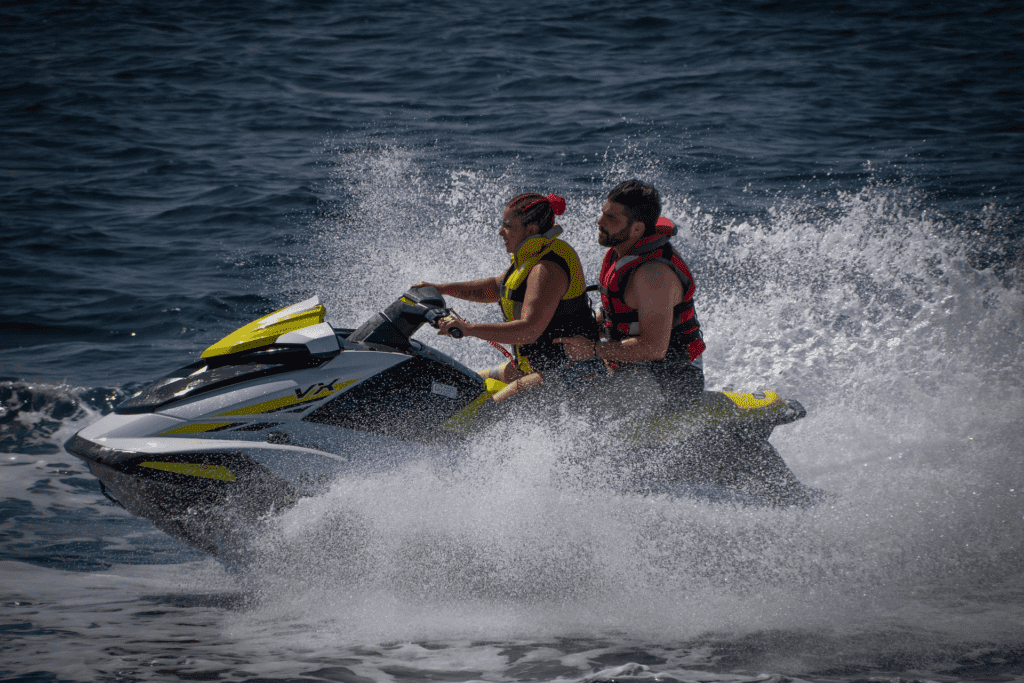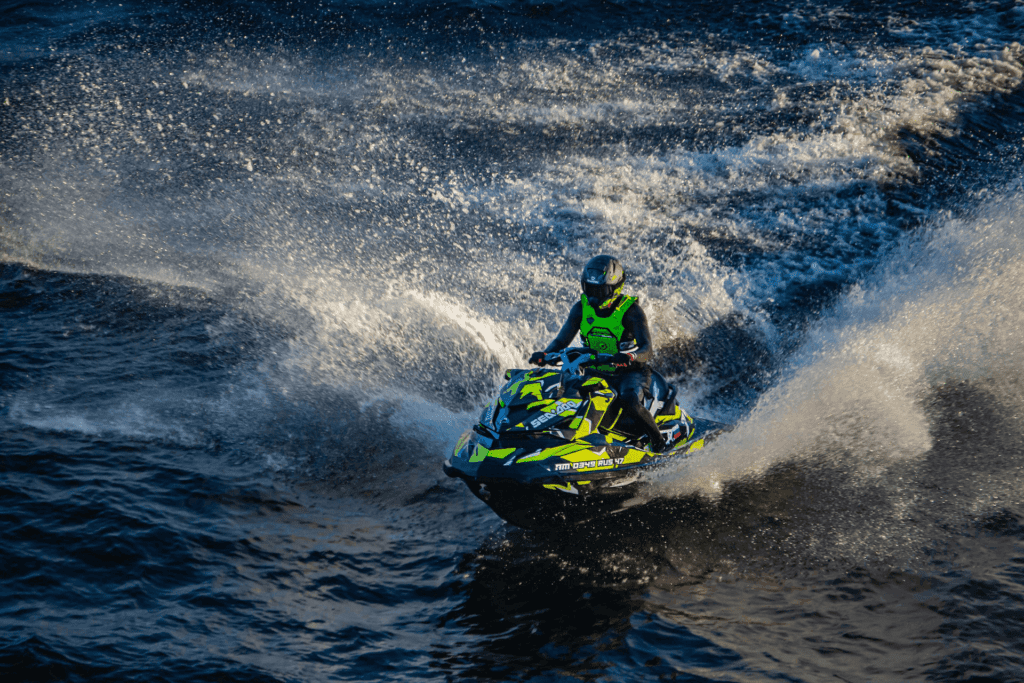Recreational boating has become a popular leisure activity in the US as more people realize the mental health benefits of being outdoors and on the water.
In 2021, the US had approximately 11.96 million registered recreational vessels. Section 2101 (25) of the United States Code (US Code) Title 46 defines recreational vessels as a type of vessel primarily intended for pleasure.
Personal watercraft (PWC) are among the most common vessels for recreational boating. They are commonly referred to by their brand names, like Kawasaki Jet Skis, Waverunner, and Sea-Doos. Although fun and popular, using jet skis and other PWCs present inherent dangers.
The US Coast Guard (USCG) recorded 4,439 boating accidents that resulted in 658 fatalities and 2,641 injuries in 2021. Personal watercraft use accounted for 19% of these accidents, causing 55 deaths and 670 injuries.
Victims of boating accidents can get compensation for the injuries and losses they sustained. However, like any other personal injury case, victims must prove that someone else was negligent and they suffered injuries as a result.
A personal injury lawyer will be valuable in demonstrating that one or more parties didn’t exercise reasonable care, leading to the accident and your injuries.
Key Takeaways
|
What are the most common dangers of jet skis?
Jet skis can create dangerous situations due to their high speed and maneuverability. Even the slowest models can reach speeds of up to 40mph.
Knowing what awaits you on the open water can be crucial whether you’re a first-time jet skier or an experienced operator. It will help you take better precautions to avoid getting into a jet ski accident.
Based on the reported accidents to the USCG, the most common dangers associated with jet skis include the following:
Collisions with fixed objects and other watercraft
Most jet ski accidents occur when the vessel collides with stationary objects or other watercraft. Due to their smaller and lighter structure, jet skis are more prone to capsizing, which can lead to collisions with fixed objects and other recreational boating vessels.
The risk of capsizing is significantly higher when more than one person is riding a jet ski. Too much weight on the vessel can cause it to turn over, especially when it hits a sudden wave.
Additionally, objects like buoys, dock parts, or shipping containers can be challenging to spot beneath the water’s surface. If the jet ski travels at high speeds and hits a submerged object, it can cause severe harm.
Vehicle malfunction or failure
Mechanical or technical issues can cause problems for jet skis. The same goes for nearly all watercraft. However, inadequately maintained jet skis are notably vulnerable to breakdowns at the worst possible moments.
Mechanical failure or malfunction is among the most common causes of jet ski accidents. Here are examples of issues that may cause the jet ski to lose control and collide with other watercraft or stationary objects:
- Engine misfires
- Faulty steering
- Water leak
- Weak batteries
Driver’s inexperience
Jet skis are primarily used for leisure. Consequently, riders and passengers of jet skis usually have little to no experience, resulting in risky maneuvers, such as speeding.
Watercraft like jet skis often don’t have brakes. The only way to stop them is by shutting down the engine and allowing the water to slow down the watercraft. As a result, it’s difficult to abruptly stop a jet ski, especially when traveling at high speeds.
Even jet ski models equipped with brakes need plenty of room to stop. Moreover, inexperienced drivers don’t know the vehicle’s capabilities. Hence, they are likely prone to high-speed accidents and other jet ski dangers.
Unsurprisingly, many personal watercraft accidents involve operator inexperience. Besides driving at excessive speeds, these operators may execute abrupt turns and overlook other watercraft or obstacles in the water.
Inclement weather
Inclement weather is one of the scariest situations to experience while on open water. It can cause choppy waters or large waves, creating unsafe conditions for riding jet skis. High winds and rough water conditions make jet skis vulnerable to capsizing or colliding with other vessels or obstacles.
Furthermore, maintaining control when operating a jet ski on strong water currents is challenging. Fog and rain can lead to poor visibility, making it harder for operators to spot other watercraft and avoid potential hazards.
It’s essential to check weather forecasts. However, sudden weather changes can catch jet ski operators by surprise, causing them to lose control of the vehicle and get into an accident. Hence, when operating a watercraft, everyone must stay vigilant and prepared for weather changes.
Lack of protection
Jet skis lack the protective shell a high-powered motorboat provides, leaving riders with little protection in case of an accident. Even a high-speed fall or powerful thrust generated by the pump can cause serious injuries and even death.
Jet ski injuries can occur in numerous ways, from crashing into stationary objects to being thrown off the vehicle. Regardless, any sudden stop or impact causes physical trauma to the body, especially when the jet ski moves at excessive speeds.
The risk of sustaining jet ski injuries is significantly higher without proper protective gear like a helmet, wetsuit, flotation device, and life jacket. These injuries may include:
- Concussions
- Cuts and bruises
- Fractured or broken bones
- Back and neck injuries
- Head injuries
- Spinal cord injuries
Who bears the liability for jet ski accidents?


Determining liability in personal watercraft accidents can be complex. Although it depends on specific circumstances and details of the incident, the most frequent grounds for personal watercraft accidents is negligence.
Under the common law, a negligence case arises when an individual or entity has a legal duty to exercise reasonable care toward another person but fails to do so. This breach of duty can take the form of carelessness or inaction, causing harm or injury to another.
Multiple parties may be found negligent and share responsibility for a jet ski accident. The court may use comparative negligence rules to assign fault, depending on the state where the accident occurred.
Although you may share partial responsibility for the accident, you can still recover damages. But the principle of comparative negligence reduces the percentage of your fault.
Here are the parties potentially liable for jet ski accidents and the circumstances for which you can hold them accountable:
Operators
Boat and jet ski operators have a legal duty to prioritize the safety of others on the water. They must comply with water-safety laws and operate their jet skis reasonably and responsibly. Failure to do so can result in a negligent operation, especially if it causes an accident and results in injuries.
A jet ski operator can be held liable for causing an accident in numerous situations. Some examples include:
- Driving the jet ski at excessive speeds
- Operating the watercraft under the influence of alcohol or drugs
- Failing to have the required safety equipment on board
- Operator inattention or not maintaining a proper lookout
- Insufficient experience or qualifications
A person operating a vessel carelessly or recklessly or disrupts the safe operation of another vessel may be subject to penalties under Section 2302 of the US Code Title 46.
Rental or sales companies
Companies that rent or sell watercraft have a responsibility to ensure their vehicle is safe to operate. This responsibility includes conducting proper maintenance and repairs.
If you can prove they were negligent in keeping these responsibilities, you may hold them liable for any damages. The following are examples of negligent acts of a jet ski rental or sales company that may result in an accident:
- Not inspecting the vessel within the legally prescribed time frame for mandatory inspections
- Allowing an inexperienced individual to operate the jet ski
- Failing to comply with the applicable laws in the state where the accident took place
Manufacturers
Manufacturers have a legal obligation to ensure that their vessels don’t pose a risk of serious injuries to boaters and users. Suppose you get injured in a jet ski accident because of defective parts. You can file a claim against the jet ski manufacturer.
Here are some defects that may cause a jet ski accident, where a manufacturer may be liable for resulting damages.
- Manufacturing defects: These may include faulty fuel pumps that pose a significant risk of fire or defective nuts that let water seep into the vessel.
- Design defects: These may encompass a malfunctioning steering wheel that sticks or slips during normal operating speeds, causing the operator to lose control of the watercraft.
- Failure to warn: Consumers have the right to receive an adequate warning about the potential hazards of operating a watercraft. Failing to warn or notify consumers of these hazards may constitute negligence.
The Importance of Hiring a Lawyer After a Jet Ski Accident


Hiring a personal injury attorney is crucial after getting injured in a jet ski accident. As you focus on recovering from your jet ski injuries, a lawyer experienced in accidents involving jet skis can handle your case and safeguard your rights.
The cost of hiring a lawyer may discourage some people from getting legal representation. Similarly, some may believe that their injuries are not significant enough to require professional legal assistance.
However, in many cases, you can only obtain fair compensation with the assistance of a legal professional. If you’re unsure whether to hire a lawyer, here are a few ways they can help you after a jet ski accident.
Navigate the legal system
Different laws and regulations may apply to jet ski accident cases, which may affect your rights to compensation. When those laws are breached, the violations may be used as proof of causation or fault in a jet ski accident.
However, the liability rules for individuals who sustain injuries during recreational boating may differ from those injured on boats for work. Thus, working with a personal injury attorney knowledgeable in state and local laws is essential to determine at-fault parties.
An experienced lawyer will know which laws or regulations cover your case and pursue the best legal action. Based on the specifics of the accidents, they will investigate thoroughly and identify which parties should bear responsibility for your injuries.
Recover the maximum damages
Injured victims of jet ski accidents may be entitled to recover damages to compensate for their losses. However, the recoverable amount depends on the extent of their injuries and losses. The more serious your injuries are, the more likely you’ll receive a larger compensation.
Besides determining your eligibility to receive compensation, an attorney knows the types of damages you can obtain. They will negotiate with the insurer and ensure you get the maximum compensation for your economic and non-economic losses.
Economic damages typically include property damage, medical expenses, lost wages, and other financial costs. In contrast, non-economic damages refer to your losses that don’t have exact monetary value, such as emotional distress, loss of companionship, and pain and suffering.
Moreover, providing proof of such damages is crucial for increasing your chance of full recovery. A personal injury lawyer will collaborate with medical professionals and other experts to collect evidence supporting your claim.
Take your jet ski accident case to court
Most jet ski accident cases are resolved out of court. However, some
Did you know?
According to the US Coast Guard report, recreational boating accidents caused around $67.5 million worth of damage to property in 2021.
Obtain the Best Legal Assistance After a Jet Ski Accident
A jet ski accident can have devastating effects on injured victims and their families. Although accidents involving watercraft are not always a result of someone else’s mistakes, most happen because of negligence.
You can hold the negligent parties liable for the injuries and losses you incurred after a jet ski accident. However, proving that someone was negligent and at fault requires an attorney’s expertise. Thus, working with an attorney can increase your chance of getting a successful outcome in settlement negotiations or legal proceedings.
You can obtain free consultation of your case at The Personal Injury Center. Once you’re ready, we can put you in touch with a reliable law firm that employs personal injury lawyers specializing in your case. Call us today to discuss your needs and what we can do to help you.
Protect your legal rights with a ski accident attorney. Contact The Personal Injury Center to find the best legal help.
FAQs on Understanding Jet Ski Dangers and Liability for Negligent Parties
What should you do after getting involved in a jet ski accident?
Experiencing fear and confusion is a normal response after getting involved in any boating accident. But knowing what to do after the incident can help protect your rights and ease the insurance claim process.
Suppose you or a loved one got hurt in a jet ski accident. Here are some actions you could take to ensure fair compensation for any resulting injuries:
- Prioritize your safety and seek medical attention immediately.
- Report the jet ski accident as required in Section 173.55 of the Code of Federal Regulations.
- Take photos of the resulting injuries, property damage, and relevant evidence.
- Collect insurance details and personal information from everyone involved.
- Check your policy and notify the insurance provider about the accident.
- Contact a jet ski accident lawyer to handle the legal process on your behalf.
Does signing a liability waiver hurt your ability to sue after a jet ski accident?
Most jet ski and watersports recreational activities require signing a liability waiver. Its purpose is to protect service providers from any potential liability by restricting the victim's right to file a lawsuit. However, even if you signed the waiver, you may still sue for damages, particularly if you were injured because of gross negligence.
What’s the average settlement for a jet ski accident claim?
Compensation for jet ski accidents varies significantly depending on the extent of injuries and losses. Some victims can receive thousands to hundreds of thousands of dollars. Some can receive millions if the property damage and personal injuries sustained are severe and permanent.
An attorney can help calculate your compensation and ensure it covers the extent of the losses you incurred due to the accident.



